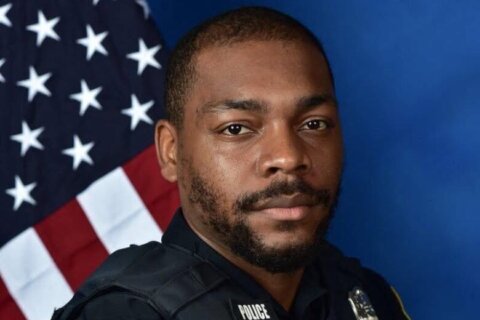The doctor whom millions of Americans looked to for guidance in daily briefings during the early days of the COVID-19 pandemic is stepping down as the nation’s top infectious disease expert. But Dr. Anthony Fauci tells WTOP he isn’t done working just yet.
Along with directing the National Institute of Allergy and Infectious Diseases, Fauci is chief medical adviser to Joe Biden, the seventh president Fauci has served under.
After 54 years with the NIH, Fauci said his work isn’t done yet.
This video is no longer available.
Watch Dr. Anthony Fauci talk with WTOP’s Nick Iannelli on his decision to step down and his hopes for his replacement.
“I feel strongly that as long as I have the energy and the passion and the commitment to continue to do public service, I want to do it in a different venue than the federal government,” Fauci told WTOP’s Nick Iannelli.
Instead, he said, he wants to write, lecture and get involved in similar activities “to hopefully inspire the younger generation of scientists and would-be scientists to choose a career in public service, particularly in the arena of public health and medicine.”
He also expressed interest in “perhaps even writing a book or a memoir of some sort to give people the opportunity to look in depth at what one can do in public service.”
Despite being the target of politicians’ rhetoric and even threats of violence over the last two years, Fauci, 81, said the “stress” of being thrown into what he called a “political hurricane” didn’t motivate his decision to retire.
“The pressure was not comfortable. The politicization is unnecessary and unfortunate,” Fauci said. “But that really didn’t have any substantive impact on my decision.”
Hindsight
Fauci said he hopes future scientists will learn from the COVID-19 response.
When asked what he would have done differently in response to the outbreak, Fauci said, “the science guided what we did, but what we know now tells us that the science evolved.”
Fauci said that when guidance was initially given downplaying the use of face masks, there was no research to support their use outside of medical environments. He said scientists also didn’t know that the virus mostly spread through asymptomatic people and through the air.
“Had we known that, then we would have been pushing for masks very vigorously in January” 2020, he said.
Once the benefits and availability of masks became clear, as well as an understanding of the ways the virus spreads, he and his colleagues “vigorously recommended masks,” he added.
Yet two years later, he said, he still observes some confusion over appropriate times to mask. On his walks with his wife on the C&O Canal, Fauci said he sometimes sees runners masked up.
“I like to say, ‘Hey, you know, take your mask off’,” Facui said. “It’s easier to run without a mask, particularly when there’s nobody near you.”
Looking forward
Monkeypox
His decision to step down comes at a time where another virus is on the rise — monkeypox.
Since the first case in the U.S. was identified in May, the number of total confirmed monkeypox infections now tops 15,000, according to the CDC.
“The difference between this and other situations we’ve been in is that we do have good diagnostic tests; we have good vaccines, and we have therapy,” Fauci told WTOP. “So the real challenge is to implement those and make them available, particularly to the people who are at risk.”
Monkeypox is mostly spready through skin-to-skin contact, including during sex. To a lesser extent, it can be spread through objects the infected person touched such as clothing or blankets.
Fauci acknowledged the response was slow to start, “because the demand for vaccines clearly outweighed the supply and accessibility.”
With the increased supply of vaccines over the last month, “in general, the manner in which it’s spread should not be a threat to the general population,” he said.
His replacement
Fauci said his successor will be chosen by Dr. Lawrence Tabak, the head of the NIH, after a nationwide search.
Though he isn’t directly involved in the appointment, he shared his wish list of qualities for that person with WTOP.
“I just want someone who has a commitment and a burning passion and desire for public health in the arena of infectious and immune-mediated diseases, who has experience, who knows how to deal with people, and who has a good scientific background.”
WTOP’s Nick Iannelli contributed to this report.








